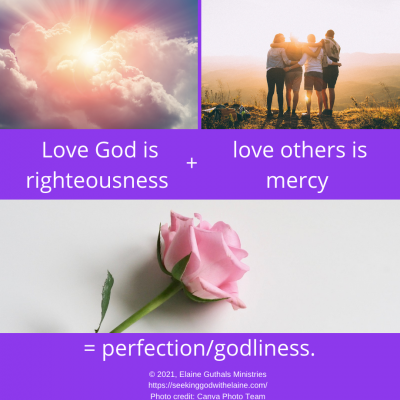God wants His children to be unified. This daily devotional looks at how disciples of Christ should love others, which shows itself in our humility.
Nuggets
- Disciples are to love one another, especially our brothers and sisters in Christ, so that we can support them when in their needs.
- We are to rejoice with others in their joy and encourage them in their hardships.
- Living in harmony with others allows for God’s love to shine through.
To read devotions in the Redo for Godliness series, click the appropriate button below.
Devotions in the Transformed to Perfection series

Disciples should live in harmony with others. Spurgeon gave how we do that an interesting name. He wrote, “Those who are one in the higher life should show their holy unity by true fellow-feeling.”
Resource
I love that. Let’s dig in and see how we accomplish that.
Let's Put It into Context
Here is a running list of what we’ve discussed previously.
Bottom Line Is to Love Others
“Share with the saints in their needs; pursue hospitality. Bless those who persecute you; bless and do not curse” (Rom. 12: 13-14 CSB)
Disciples are to love one another, especially our brothers and sisters in Christ, so that we can support them when in their needs.
I looked at the sermons under this verse, and I wondered how it was mainly talking about us completing the second commandment. When we add it to the first greatest commandment — loving God — disciples gain perfection.
Glossary

For disciples, our love for each other promotes the unity needed to complete our mission. “Complete my joy by being of the same mind, having the same love, being in full accord and of one mind” (Phil. 2: 2 ESV).
Love Others
“By this all people will know that you are my disciples, if you have love for one another” (Jn. 13: 35 ESV)
Let’s look at Spurgeon’s term fellow-feeling. It gives us insight on how we are to love others.
Fellow — The definition talks about being on an even plane. “For God does not show favoritism” (Rom. 2: 11 NIV). Dale put it this way: “All men are dear to the heart of God, and therefore they must be dear to us.”
Resource
Feeling — We have to get the emotions involved. It means that we have a sympathetic spirit.
The emotions help us build the relationship with God. They also help us to become invested in the lives of those to whom we are witnessing.
Love Our Enemies
“But I say to you, Love your enemies and pray for those who persecute you” (Mt. 5: 44 ESV)
Wait! What?
Aren’t we supposed to condemn the bad guys? Surely, not love them!
It is really hard to love those that are persecuting us. We like to think of persecute as oppressions and abuse — something that we did not do anything to warrant this type of action.
But persecution is also punishment. We did something to cause this to happen to us.
Tyson reminded that — sometimes — the persecutor is addressing what s/he feels is a wrong. However, it is up to God to judge our enemies, not us.
It is our job to try to win them to God. We are to model God’s patience to them.
God may have a very specific job for them to do. Look at Paul. He had been persecuting the church until God showed him how to use his character and drive to further His kingdom.
How are they so helpful to God’s kingdom? Tyson wrote, “But the man who persecutes earnestly, feels strongly, and thinks vigorously; and when his violence has somewhat abated his wrath, and he begins to feel in what an unpleasant business he is engaged, he is almost sure to think of some other aspects of the question. The truth may then begin to scintillate within his soul, growing brighter as he pursues the meditation, till, by the grace of the Spirit of truth, his heart relents, his conscience begins its work of self-accusation, and he is won.”
Resource
Solomon reminded us that trying to persecute our enemies on our own will lead to harm. We’ve got to follow God’s Will, not our own.
How do we bless our enemies? Solomon gave us a list.
- Show appropriate pity.
- Patiently deal with them.
- Pray for them.
- Pardon them — a.k.a. forgive them.
- At times, support them in some financial way.
Resource
God wants us to be unified with others.
Feeling the Feelings with Others
“Rejoice with those who rejoice; weep with those who weep” (Rom. 12: 15 CSB).
We are to rejoice with others in their joy and encourage them in their hardships.
We can’t just think of ourselves and our own situations. It isn’t about our happiness and misery.
We need to support and encourage others. In this way, we show them God.
Abercrombie lists some things in which we can rejoice with others. He wrote, “Every conversion, every time of hallowed fellowship, every act of kindness, all tidings of good being done in any part of the world, fill his heart with joy.”
Resource
When we meet others where they are at and address what they are at the time, we build connections. These connections are built into relationships so that we can witness the love of God to others.
The sympathetic spirit really comes into play here. Dale put it this way. He wrote, “We owe sympathy to other men because it is an effective means of contributing to their moral perfection, and because by withholding it we inflict on them grave moral inquiry.”
Resource
The great news is Dale told us sympathy can be developed. We have to be intentional in developing sympathy. Yes, that will take effort.
Hughes noted, “All done to the distressed under its influence is done by love, hence it is both pleasurable and lasting.” The love means there is no discrimination because of race, ethnicity, or socioeconomic status.
Resource
We have to make it about other people so that we build opportunities to witness to them.
Love Builds Harmony
“Live in harmony with one another. Do not be proud; instead, associate with the humble. Do not be wise in your own estimation” (Rom. 12: 16 CSB)
Living in harmony with others allows for God’s love to shine through.
One of the major themes in the Book of Ephesians is unity of the believers. That unity encompasses a lot of elements.
“Therefore I, the prisoner in the Lord, urge you to walk worthy of the calling you have received, with all humility and gentleness, with patience, bearing with one another in love, making every effort to keep the unity of the Spirit through the bond of peace. There is one body and one Spirit — just as you were called to one hope at your calling — one Lord, one faith, one baptism, one God and Father of all, who is above all and through all and in all” (Eph. 4: 1-6 CSB).
Having pride isn’t the way to go. God calls us to be humble.
My Ladies and I talked today about pride wanting us to understand everything so that we can say we don’t need God since we have figured it out. That isn’t what God wants.
God wants us to be humble and submissive to Him. The submissive part means that we don’t sin and give Him the glory He deserves.
One thing Paul is saying here is we can’t think more highly of ourselves than we are. We have to acknowledge that, without a relationship with God, we are nothing.
Lyth told us that this high opinion of ourselves presents itself in our opinions, judgment, and plans.
Resource

Making the Connections
It is easy to love people when they are lovable — i.e. fit into our expectations and beliefs. Talmage wrote, “When our guests are cheery, and fascinating, and elegant, it is very easy to entertain them; but when we find in them that which is antagonistic to our taste and sentiment, it is a positive triumph when we can be ‘given to hospitality.’”
Resource
We need to love them anyway.
How Do We Apply This?
- Watch our reactions to those who believe differently than we do. God does not call us to judge them.
- We should not attempt to control their feelings and actions, therefore, diminishing their joy.
- See things from their angle.
- Promote the joy of others by doing all within our means through our words and actions.
- Make it part of our mission to help the needy and improve the distress of others.
- Do the work God wants us to do, not what we want to do.
- Treat all others the same.
- Diligently seek God.
- Study examples of faithful men and women.
- Follow the promptings of the Holy Spirit.
- Live in unity with others.
Searching for and Seeking God
Hearing His Word (Rom. 10: 17).
Reading His Word (Rev. 1: 3).
Praying to Him (Heb. 4: 16).
Studying His Word (Ac. 17: 11).
Meditating on His Word (Ps. 1: 1-2).
Memorizing His Word (Ps. 119: 11).
Resource
We’ve gotten all the way through the devotion and haven’t really talked about how we are transformed to do that. I think the transformation comes in because the love and harmony we are talking about isn’t the worldly love and harmony.
We are loving others in the name of the Heavenly Father. We are humble because we know we are nothing without God.
This shifted focus is where the transformation comes in. But we want to shift to put God as our priority.
Father God. We want to be like You. As You are love, we want to love others – even our enemies. Help us to be transformed to be like You. Amen.
The ABCDs of Salvation
If you have not become a believer in Christ, please read through the
Plan of Salvation and prayerfully consider what God is asking you to do.
A – admit our sins
B – believe His Son Jesus is our Redeemer
C – confess God as Sovereign Lord
D – demonstrate that commitment by making any changes needed in our lives to
live the way in which God has called us
The Disciple’s Job Description
What do you think?
Leave me a comment below (about this or anything else) or head over to my Facebook group for some interactive discussion.
If you don’t understand something and would like further clarification, please contact me.
If you have not signed up for the email daily or weekly providing the link to the devotions and the newsletter, do so below.
If God has used this devotion to speak with you, consider sharing it on social media.
Pingback: Joy through Humility – Seeking God with Elaine